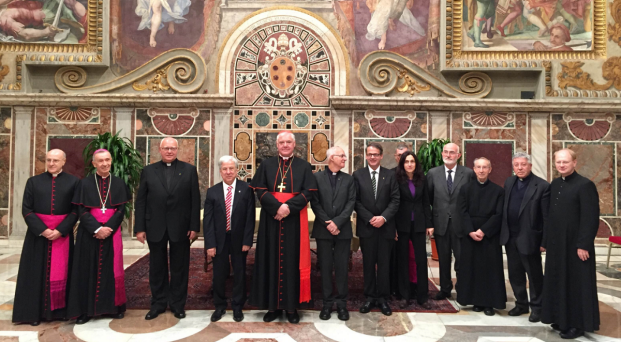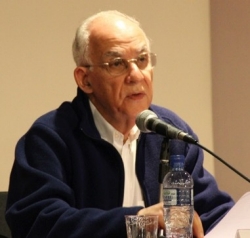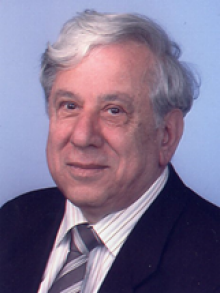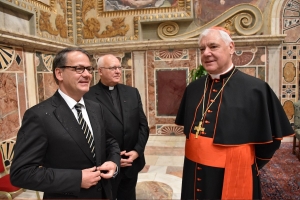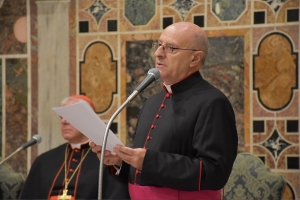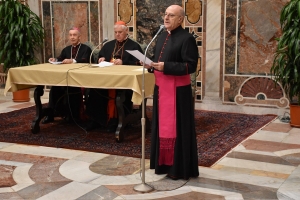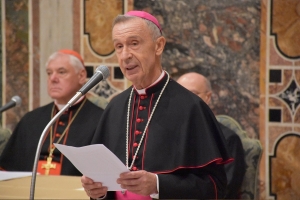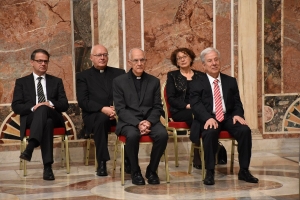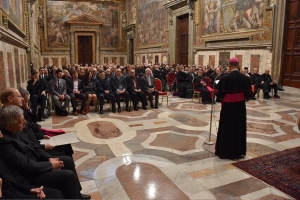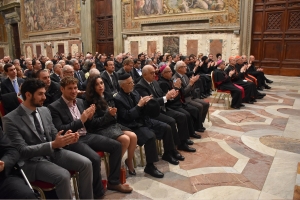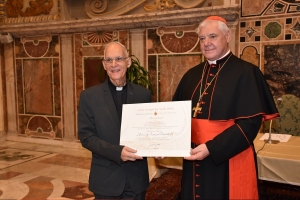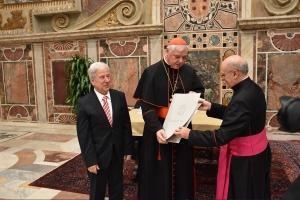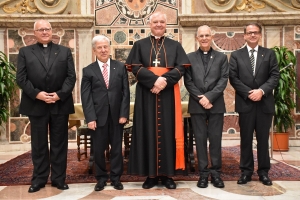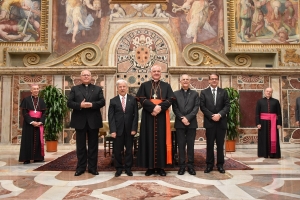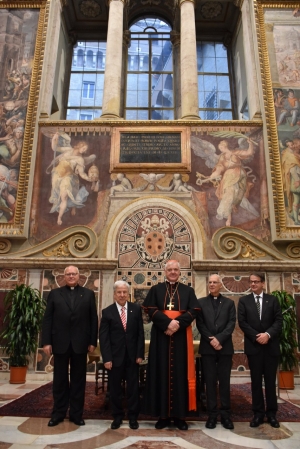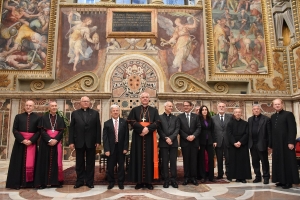The celebration of the fifth edition of the Ratzinger Prize was held on 21st November 2015. The prize was awarded to Mario de França Miranda, Brazilian Jesuit priest, full professor of Theology at the Pontifical University of Rio de Janeiro and to Nabil el-Khoury, Lebanese professor of Philosophy and Comparative Literature at the l’Université Libanaise of Beirut and the University of Tubingen. He also translated the Opera Omnia of Joseph Ratzinger-Benedict XVI in Arabic.
The profiles of the scholars were outlined by the archbishop Luis Francisco Ladaria, secretary of the Congregation for the Doctrine of the Faith and of the Scientific Committee of the Joseph Ratzinger – Benedict XVI Vatican Foundation, because the new president of the Scientific Committee appointed by the Pope, cardinal Angelo Amato – prefect of the Congregation for the Causes of the Saints – was in Spain for a beatification ceremony.
During his greeting, Msgr. Giuseppe A. Scotti, President of the Joseph Ratzinger – Benedict XVI Vatican Foundation, explained that through the Ratzinger Prize “the Pope and the Church want to thank two men who distinguished themselves as scholars, professors and researchers”.
The award-winners are from Brazil and Lebanon, “countries that are living the same situation Pope Francis described in the Evangelii Gaudium; in fact the Pope said that ‘new cultures are constantly being born in these vast new expanses where Christians are no longer the customary interpreters or generators of meaning. Instead, from these cultures they take new languages, symbols, messages and paradigms which propose new approaches to life, often in contrast with the Gospel of Jesus’. These are the places in which dramatic events take place today and in which ‘a completely new culture has come to life and continues to grow in the cities’ ”.
“With their writings and their long academic lives, they demonstrated that ‘what is called for is an evangelization capable of shedding light on these new ways of relating to God, to others and to the world around us, and inspiring essential values. It must reach the places where new narratives and paradigms are being formed, bringing the word of Jesus to the inmost soul of our cities’. Cities are now multicultural and Pope Francis added that ‘in some places a spiritual desertification has evidently come about, as the result of attempts by some societies to build without God or to eliminate their Christian roots’ ”. “The Pope wanted to give the prize to people who live and work in the ‘suburbs of the world’ where it is evident that ‘the Christian world is becoming sterile, and it is depleting itself”, as the president of the Vatican Foundation added.
“In the places in which there is a spiritual desertification, these two scholars will give hope to the women and men living in love for their faith and in respect for the human reason”.
Cardinal Gerhard L. Müller, prefect of the Congregation for the Doctrine of the Faith and delegate of Pope Francis, awarded the prize.
“In the last years – said the cardinal – The Joseph Ratzinger-Benedict XVI Vatican Foundation awarded theologians from the west side of the world. Now this important award is given to two important scholars from Lebanon and Brazil”.
“Even if the East had been the birthplace of Christianity, the missionary movements, during the age of the discoveries, led to the spreading of the doctrine of the faith and the traditions of the western catholic culture on a worldwide scale – said cardinal Müller – That is the reason of the spreading of the Catholic Church.
The Churches of Africa, Latin America, and the Asiatic East are the synthesis of the faith and its cultural explication. The catholic nature of the Church appears in the several ways of expression of the Christian faith and is both a precautionary present and dynamic process to give Christ – the incarnated Son of God – a ‘body’, that is the Church living in the world”.
“Dear Professors Nabil el-Khoury and Mario De França Miranda – the cardinal concluded – I am happy to award you with the Ratzinger Prize, in the name of Pope Francis. You have stood out for your research and academic activities. Congratulations from all of us and from the people who are here to pay homage to you. Thank you so much!”.
The celebration of the Ratzinger Prize was held at the end of the International Symposium “Deus caritas est. Porta di Misericordia”, organized for the 10th anniversary of the publication of the first encyclical of Benedict XVI. It was attended by the cardinals Bertone, Cordes, Grech, Koch, Monteiro de Castro and Sandri, the archbishops Becciu and Farhat, Christian Schaller and Waldemar Chrostowski, who received the Prize in 2013 and 2014, the members of the Scientific Committe, of the Board of Directors and of the Board of Revisers of the Joseph Ratzinger – Benedict XVI Vatican Foundation.
The greetings of Msgr. Giuseppe A. President of the Joseph Ratzinger-Benedict XVI Vatican Foundation
The speech of Gerhard Ludwig Müller, Prefect of the Congregation for the Doctrine of the Faith

